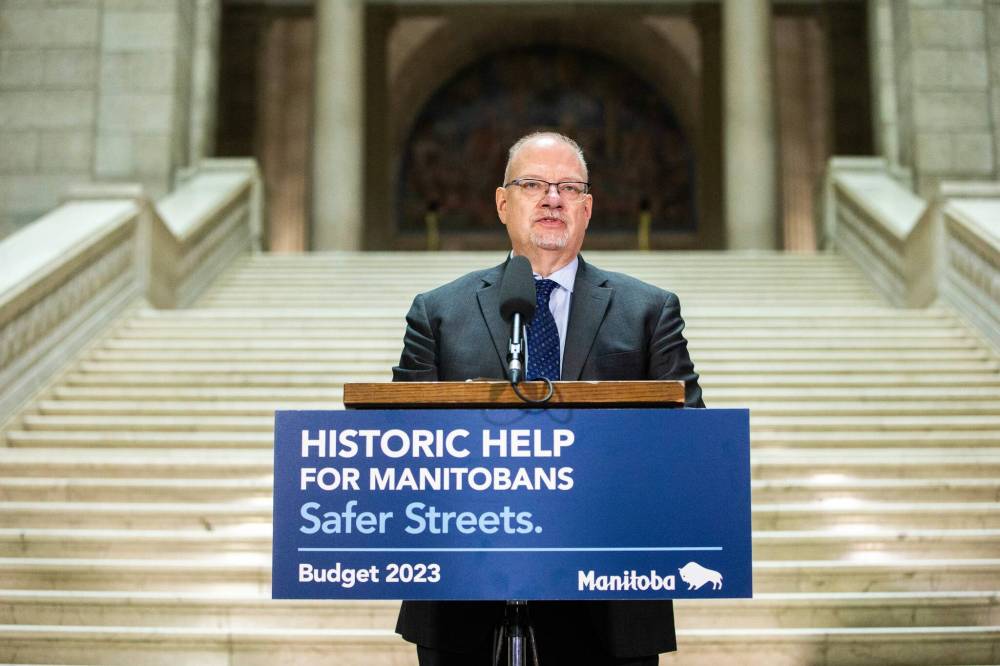Quiet reception for safety officer legislation
Advertisement
Read this article for free:
or
Already have an account? Log in here »
We need your support!
Local journalism needs your support!
As we navigate through unprecedented times, our journalists are working harder than ever to bring you the latest local updates to keep you safe and informed.
Now, more than ever, we need your support.
Starting at $15.99 plus taxes every four weeks you can access your Brandon Sun online and full access to all content as it appears on our website.
Subscribe Nowor call circulation directly at (204) 727-0527.
Your pledge helps to ensure we provide the news that matters most to your community!
To continue reading, please subscribe:
Add Brandon Sun access to your Free Press subscription for only an additional
$1 for the first 4 weeks*
*Your next subscription payment will increase by $1.00 and you will be charged $20.00 plus GST for four weeks. After four weeks, your payment will increase to $24.00 plus GST every four weeks.
Read unlimited articles for free today:
or
Already have an account? Log in here »
Hey there, time traveller!
This article was published 26/04/2023 (999 days ago), so information in it may no longer be current.
WINNIPEG — New legislation that would give community safety officers new powers to arrest and respond to safety threats on Winnipeg Transit and Manitoba First Nations is receiving little feedback from those potentially impacted most.
Just one presenter has registered to respond to Bill 34 (Act to Amend the Police Services Act) at a committee meeting this evening at the Manitoba legislature.
The legislation, introduced by Justice Minister Kelvin Goertzen, would give community safety officers and First Nations safety officers authority to provide an initial response to situations that pose a safety threat until police arrive.

Justice Minister Kelvin Goertzen. (Winnipeg Free Press)
The bill passed second reading and now goes to a committee, where members of the public and stakeholders have an opportunity to offer input on the legislation expected to pass before the house rises June 1.
While more than 80 presenters registered to speak to Bill 35 (creating a teachers registry), just one signed up (a representative of the Manitoba Nurses Union) to speak to changing the Police Services Act.
The union representing Winnipeg Transit operators and mechanics had no idea there was an opportunity to speak to the bill, said its leadership.
“If we want to work collaboratively on this issue, it would be appreciated if the city reached out and said, ‘This amendment to the Police Services Act is going to be heard on this day, if you’d like to make a presentation,’” Amalgamated Transit Union Local 1505 president Chris Scott said Tuesday.
“We would have at least prepared a statement to be presented to the committee,” said Scott, adding members support the bill. “We would like to see a security team that is provided with appropriate powers under the law to deal with problem issues on the bus.”
No representatives from the Assembly of Manitoba Chiefs, other Indigenous organizations or the City of Winnipeg were registered, as of Tuesday, to speak to the bill.
Goertzen said he hopes the lack of presenters “indicates people are relatively satisfied there needs to be changes to the Police Services Act.”
“It may also speak to the fact that we’ve had broad consultation on the bill with police services and others,” including First Nations policing, the justice minister said.
A spokesman for the City of Winnipeg said it has had informal discussions with provincial counterparts about the bill’s potential impact, and was not making a presentation to the committee.
Mayor Scott Gillingham campaigned on having Transit safety officers on board its buses.
The city has set aside $5 million for officers to be deployed on routes with the greatest need. Five such routes accounted for 44 per cent of all reported assault and unruly passenger incidents in recent years.
The equipment and powers Transit safety officers will be permitted to use will be determined through discussions between the city and the province.
Meanwhile, the bill does nothing to address the “root cause of crime” and there’s no point in speaking to it, said Social Planning Council of Winnipeg executive director Kate Kehler.
“We are … in an election year and the current government is falling back on ‘tough on crime’ rhetoric,” she said.
“That the evidence demonstrates it does not make communities safer seems to be beside the point,” Kehler said. “More money will be spent on what does not work, policing and securitization of some spaces that simply moves the problem elsewhere, as opposed to eradicating poverty, which is a root cause of crime.”
Community safety officers programs have been tried in other jurisdictions but don’t last because they don’t solve the problem, said University of Winnipeg criminal justice Prof. Kevin Walby.
“Sometimes the funding is pulled or they find out it’s not that great of a policy option — it doesn’t work the way they thought,” he said Tuesday.
“You’ve got people in distress, who are facing deprivation or isolation that may have mental health issues, addiction issues. That’s the kind of stuff you have to address… If you just anoint a bunch of people community safety officers, it’s just like a really small Band-Aid on a much bigger issue,” Walby said.
“We seem to be pulling money off the table for all of those kinds of programs or at least not supporting them in the way that some people in the community are asking for them to be supported, and we keep pumping money into (policing) measures.”
» Winnipeg Free Press
